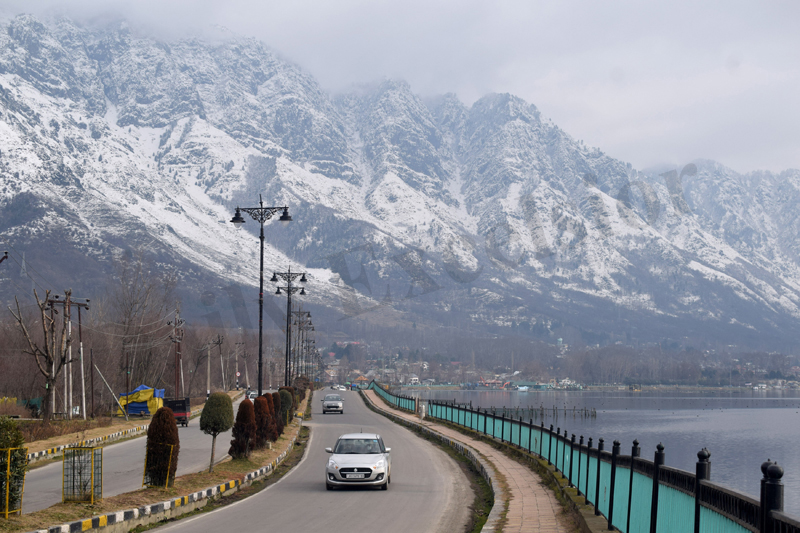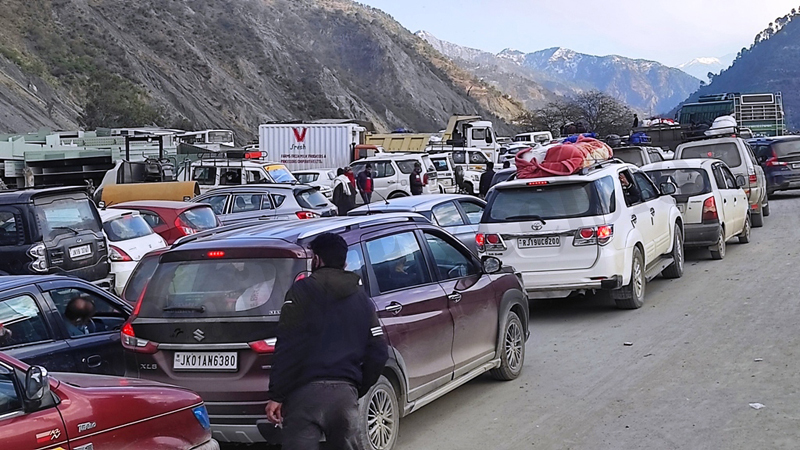Many vehicles stranded on highway
Gopal Sharma
JAMMU, Jan 11: The Jammu-Srinagar National Highway was closed at around 10 pm tonight while sub-zero temperatures continued to grip Kashmir valley.
A Traffic Police officer said that Jammu-Srinagar National Highway which was blocked third time during the day today at around 5 pm at Mehar near Ramban was restored at around 10 pm and movement of heavy vehicles towards Kashmir was allowed. However, it was later blocked again. The frequent disruptions in Ramban sector due to landslides and shooting stones created massive traffic jams.
Click here to watch video
Many truckers, who are stranded on the highway for the past several days blamed the traffic management authorities for not allowing them to move on, causing them huge financial losses as perishable goods they carry have been damaged.

The highway was closed for traffic due to a landslide in Mehar and Panthyal areas last evening. The men and machines cleared the highway of the debris and shooting stones, which pose a grave danger to the lives of the people.
The 270-km Jammu-Srinagar National Highway was reopened for traffic on Monday after remaining closed for the past three days owing to heavy snowfall and multiple landslides in Ramban district. However, it was again blocked late tonight.
The highway, the only all-weather road linking Kashmir with the rest of the country, was closed for traffic on Friday afternoon, shortly after it was opened after two days closure, following heavy snowfall and multiple landslides in the sector.
While passenger vehicles and some vehicles carrying essentials were allowed to move towards the Kashmir valley on Monday, others remained stranded on the stretch. Today morning the highway was restored at around 8.15 am but again at 11 am it was blocked due to fresh landslides at Mehar. It was again cleared at around 3 pm but the road was again blocked there at 5 pm.
It took about five long hours to the National Highway authorities to clear the debris and boulders at Mehar and the road was again restored at 10 PM only to be blocked again at 11 pm. The LMVs were diverted to old Chenab Bridge and Maitra Road.
Some vehicle owners protested over their halt on the highway and said the perishable items in their vehicles have been destroyed.
“We are stranded on the highway for the past five days. We are carrying vegetables and most of them have perished. If they allow vehicles carrying chicken, why they have halted vehicles carrying vegetables. It has caused us a grave loss,” a truck driver said.
Meanwhile, reports from Kashmir said that sub-zero temperatures returned to the Kashmir valley as the mercury plunged with Gulmarg and Pahalgam witnessing extreme cold conditions.
Gulmarg, the famous ski resort in Baramulla district, recorded a low of minus 10.6 degrees Celsius. This is for the third straight night that the minimum temperature in Gulmarg has fallen to minus 10 degrees Celsius or below, a Meteorological official said.
South Kashmir’s Pahalgam, which serves as the base camp for the annual Amarnath Yatra, recorded a low of minus 10.4 degrees Celsius, a drop of nearly eight degrees, they said.
Srinagar, the summer capital of Jammu and Kashmir, was the only place where the minimum temperature was above the freezing point at 0.2 degrees Celsius last night, the officials said.
Qazigund, the gateway town to the Valley, recorded a low of minus 0.6 degrees Celsius, while the nearby south Kashmir town of Kokernag recorded a minimum temperature of minus 1.7 degrees Celsius.The mercury settled at a low of minus 3 degrees Celsius in north Kashmir’s Kupwara.
The MeT office said the weather is likely to stay mainly dry over the next few days.
The Kashmir valley is currently under the grip of the 40-day harshest winter period known as ‘Chilla-i-Kalan’ that began on December 21.
During ‘Chilla-i-Kalan’, a cold wave grips the region and the temperature drops considerably leading to the freezing of water bodies, including the famous Dal lake here, and the water supply lines in several parts of the Valley.
The chances of snowfall are the maximum during this period and most areas, especially in the higher reaches, receive heavy to very heavy snowfall. ‘Chilla-i-Kalan’ will end on January 31.


